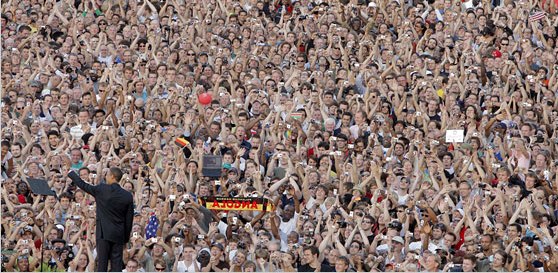
John F. Kennedy, the last presidential candidate with outsized imbalance of political sex appeal and experience, sought some advice from one of America’s great thinkers after his 1960 election and before he took office.
As Dean Acheson, who served as President Harry Truman’s Secretary of State, recalled the encounter: “He said that one of his troubles now was that he had spent so much time in the last few years on knowing people who could help him become president that he found he knew very few people who could help him be president.”
Kennedy was seeking advice from Acheson on cabinet candidates, and those choices will be critical for Barack Obama for the simple reason of his own meager foreign policy experience. The part of Obama’s trip last week most important on that score were his meetings with leaders he will need for success in a world where U.S. dominance is being replaced by messy multipolarity.
There was some strategic purpose to the images of Obama standing before 200,000 people at Berlin’s Victory Column, riding in a helicopter with General David Petraeus, and drilling home a three-point basketball shot at a U.S. military base in Kuwait. A larger measure of world admiration and public opinion helps when the U.S. shops for policy support.
But my measure of the trip’s success comes only should Obama be elected when we can better measure what he got in the way of relationships and insights from his considerable time behind closed doors with statesmen.
Crisis Inevitable
That’s true in two respects.
First, the new U.S. president will be damned with a crisis of one sort or another in his first months given the long list of possibilities: Afghan or Pakistan meltdowns, Iranian nukes, global financial instability, or Russian threats to Georgia, just to scratch the surface. Now when he calls for assistance from leading allies, they won’t be strangers. (Senator John McCain is far ahead of him in that respect.)
He will need Afghan President Hamid Karzai, for example, if he is to achieve his often-stated goal of refocusing U.S. military efforts there from Iraq. In spite of regular phone talks with President George W. Bush, U.S. officials complain that Karzai is running a corrupt regime lacking credibility and reach in much of the country.
Obama argues further sectarian political reconciliation in Iraq would allow U.S. troops to withdraw. But to get it he will have to take the measure of Prime Minister Nuri al-Maliki’s willingness to embrace Sunni and Kurdish leaders and share his country’s oil wealth with their regions. A premature withdrawal would lead to an early and more costly return.
Europe provides its own leadership challenge.
No Excuses
What an Obama election would do is remove Europe’s excuse, as would a McCain victory. The most important lines in Obama’s stirring but strikingly nonspecific Berlin speech were about the need for more European and German troops in Afghanistan and more help shouldering America’s global burdens. Bush’s unpopularity overseas has made it harder even for willing allies to help.
Obama’s speech skirted many other potential disagreements. How will Germans respond should Ukraine and Georgia continue to seek entry into NATO but Russia threatens retaliation if they join? Will the U.S. and Europe clash if talks with Iran fail and war is the only way to stop a Teheran bent on gaining nuclear weapons?
Any honeymoon might be short.
The opportunities with Europe will be considerable in the first weeks of an American presidency. German Chancellor Angela Merkel and French President Nicolas Sarkozy both favor common cause with the U.S., providing the sorts of partners even a skillful Bush would have lacked with predecessors Gerhard Schroeder and Jacques Chirac.
Free World Reboot
A new U.S. president should make his first foreign trip to Europe to reboot the Free World before the first crisis arises. If not before, the first chance would be the 60th Anniversary Summit for NATO in early April in Strasbourg, France. Bringing France back as a fully re-integrated member of NATO’s military command and launching a deeper strategic relationship with the European Union would create a useful base to build upon.
The Kennedy experience has sobering lessons for a youthful leader. The 43-year-old president with his three congressional terms and full Senate term had more road mileage than Obama with his three Senate years. His first year in office was blemished by failures that historians trace in part to inexperience: the botched Bay of Pigs invasion in April 1961, the failed Vienna Summit with Nikita Khrushchev in June and then the Berlin Wall’s rise in August.
Acheson spoke then of how the “promise in the air” was lost after the Cuban debacle as Europeans saw “a gifted amateur practicing with a boomerang and knocking himself cold. They were amazed that so inexperienced a person should play with so lethal a weapon.”
Frederick Kempe is president and CEO of the Atlantic Council. Originally published 29 July 2008 by Bloomberg News. Reprinted with permission.
Image: obama600.jpg
